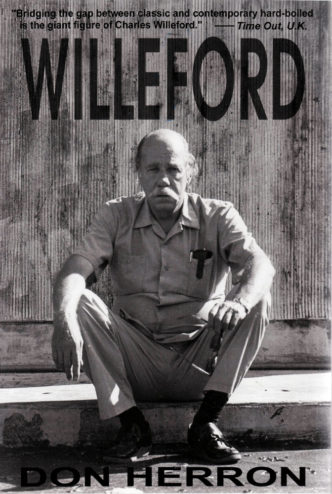 By DON HERRON (Dennis McMillan Publishers; 1997)
By DON HERRON (Dennis McMillan Publishers; 1997)
This, unfortunately, is the closest thing that exists to a biography of the late Charles Willeford. Willeford, for those who don’t know, was one of the finest, and certainly one of the quirkiest, writers to emerge from the mid-Twentieth Century hard boiled fiction scene, and lived a life that was every bit as varied and dramatic as his fiction.
WILLEFORD’S author was Don Herron, a longtime friend of his subject. That’s a fact Herron insists on reminding us throughout the text. A better title for this book might have been MY FRIENDSHIP WITH CHARLES WILLEFORD, or perhaps THE BOXES IN THE GARAGE, as the whole thing pivots on the April 1987 discovery of several moldering boxes in the garage of Willeford’s Miami home containing copies of his books and manuscripts, many of them quite rare (Herron’s descriptions of his findings seem calculated to make Willeford fanatics like myself drool).
Herron further inserts himself into the book in a 100 page-plus “In Conversation” section, consisting of transcripts of conversations between Willeford, Herron and their respective wives. The chats, which took place during the fateful boxes-in-the-garage episode, are intended to give us an indication of how Willeford, who loved to talk, spoke, but I only found them intermittently valuable. The scattered references to Sam Peckinpah were interesting, as Willeford had worked with one of the great man’s favored cast members Warren Oates, but otherwise the convos read exactly as you might expect them to: rambling, unfocused and dull.
Far more vital is the “In Life” section of the book, which provides a chronological recounting of Willeford’s life. That includes his rootless depression-era childhood and service in the Army, apparently the “most interesting time” in his life. Willeford stayed in the military through WWII and many years afterward, becoming, according to one recollection, “the only man I ever heard of who had a book of poetry published while he was a Regular Army First Sergeant.” From there he led a fairly rootless existence as he attempted to find success first as an actor and then a writer.
Willeford’s career as a novelist began with the novel THE HIGH PRIEST OF CALIFORNIA, released to the paperback market of the early 1950s, and came to include trash-art classics like THE WOMAN CHASER, THE BURNT ORANGE HERESY, COCKFIGHTER and OFF THE WALL. Despite their brilliance, none of those books did much to boost their author’s fame, much less his bank account, and by the inception of the 1980s he was all-but forgotten. That all changed with release of MIAMI BLUES in 1984, the first of a highly acclaimed four-novel series featuring Miami detective Hoke Mosely, the final installment of which, THE WAY WE DIE NOW, was published shortly before Willeford’s 1988 demise.
The “In Life” section of WILLEFORD is its standout portion due to its portrayal of the man and his moods. We learn he was quite the extrovert, and quite suspicious of anyone who lacked social skills. He also had a number of deeply held theories that might be dubbed controversial, such as one about how women who overfeed their husbands and/or children are actually trying to kill them.
Willeford, alas, was quite selective in his recollections of his life. Herron fills in the blanks by cherry-picking biographical details in Willeford’s fiction, and also the many nonfiction pieces he published throughout his life. The latter stem from the aforementioned boxes in Willeford’s garage, which leads to yet more instances of Herron inserting himself into the narrative.
The same is true of the “In Print” section of the book, containing what was for a time the most extensive Willeford bibliography in existence. It’s an admirably thorough piece of work, but once again Herron can’t refrain from making himself a part of the text, as in his entry for the 1987 RE/Search reprinting of HIGH PRIEST OF CALIFORNIA, which is more focused on Herron’s reaction to the publication than the book itself.
Final thought: in the absence of a proper Charles Willeford biography WILLEFORD will suffice, but the man deserves better.
